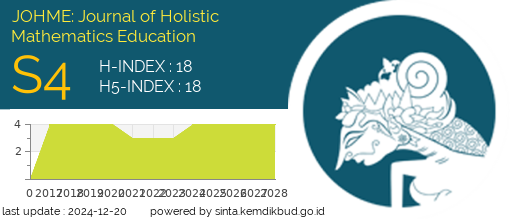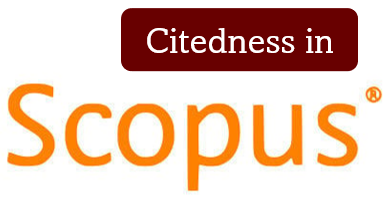PERBANDINGAN EFEKTIVITAS MODEL-MODEL PEMBELAJARAN DALAM PENCAPAIAN KEMAMPUAN BERPIKIR KREATIF SISWA [A COMPARISON OF THE EFFECTIVENESS OF LEARNING MODELS ON STUDENTS' CREATIVE THINKING ABILITIES]
DOI:
https://doi.org/10.19166/johme.v5i2.4241Keywords:
problem-based learning, problem solving, problem posing, creative thinking, students’ ability, pembelajaran berbasis masalah, pemecahan masalah, pengajuan masalah, kesulitan belajar, berpikir kreatif, kemampuan siswaAbstract
The purpose of this study was to compare the effectiveness of using the Problem Based Learning (PBL), Problem Solving (PS), and Problem Posing (PP) learning models in achieving students' creative thinking skills in social arithmetic material for a grade 7 class. Creative thinking skills is a problem variable because many students cannot answer the Higher Order Thinking Skills (HOTS) questions. This type of research is quasi-experimental with a population of grade 7 students and a sample of 3 classes. The sampling technique used simple random sampling. Data collection techniques used were documentation, observation, and tests. The test was used to measure students' creative thinking skills. Data analysis techniques used one-way Anova and post hoc (Scheffe test). The test data were analyzed using SPSS 16.0 for Windows software. The results of the study concluded that the Problem Based Learning (PBL) and Problem Solving (PS) learning models were effective in achieving students 'creative thinking abilities and the Problem Posing (PP) learning model was not effective in achieving students' creative thinking abilities. Meanwhile, there are differences in the effectiveness of using the Problem Based Learning (PBL), Problem Solving (PS), and Problem Posing (PP) learning models in the achievement of students' creative thinking abilities on social arithmetic material for grade 7 students and there are significant average differences in ability. Creative thinking of students on indicators of flexibility, and originality between groups of students who are taught with problem-based learning (PBL) and problem posing (PP) learning models.
BAHASA INDONESIA ABSTRACT: Tujuan penelitian ini untuk untuk mengetahui perbandingan efektivitas penggunaan model pembelajaran Problem Based Learning (PBL), Problem Solving (PS), Problem Posing (PP) dalam pencapaian kemampuan berpikir kreatif siswa pada materi aritmatika sosial kelas VII SMP. Pengambilan kemampuan berpikir kreatif sebagaivariabel masalah dikarenakan banyak siswa yang tidak bisa menjawab soal Higher of Thhingking Skill (HOTS). Jenis penelitian adalah eksperimen semu dengan populasi siswa kelas VII dan sampel sebanyak 3 kelas. Teknik pengambilan sampel menggunakan sampel acak sederhana (simple random sampling). Teknik pengumpulan data menggunakan dokumentasi, observasi, dan tes. Tes digunakan untuk mengukur kemampuan berpikir kreatif siswa. Teknik analisis data menggunakan one-way Anova dan post hoc (Uji Scheffe). Data tes di analisis menggunakan software SPSS 16.0 for Windows. Hasil penelitian menyimpulkan bahwa model pembelajaran Problem Based Learning (PBL) dan Problem Solving (PS) efektif dalam pencapaian kemampuan berpikir kreatif siswa dan model pembelajaran Problem Posing (PP) tidak efektif dalam pencapaian kemampuan berpikir kreatif siswa. Sementara itu, terdapat perbedaan efektivitas penggunaan model pembelajaran Problem Based Learning (PBL), Problem Solving (PS), dan Problem Posing (PP) dalam pencapaian kemampuan berpikir kreatif siswa pada materi aritmatika sosial kelas VII SMP serta terdapat perbedaan rata-rata yang signifikan kemampuan berpikir kreatif siswa pada indikator fleksibelitas, dan originalitas antara kelompok siswa yang diajar dengan model pembelajaran problem based learning (PBL) dan problem posing (PP).
References
Anggoro, B. W., & Robertus. (2012). Upaya peningkatan prestasi belajar matematika dengan model pembelajaran problem posing pada materi sudut kelas VII SMP 3 Negeri Mojolaban. Retrieved from https://repository.uksw.edu/handle/123456789/1857
Briggs, M., & Davis, S. (2015). Creative teaching: Mathematics in the primary classroom. London, UK: Routledge.
Brown, S. I., & Walter, M. I. (1993). Problem posing: Reflections and applications. Hillsdale, NJ: Lawrence Erlbaum.
Daryanto. (2009). Panduan proses pembelajaran kreatif dan inovatif. Jakarta, Indonesia: AV Publisher.
Eggen, P., & Kauchak, D. (2012). Strategi dan model pembelajaran: Mengajarkan konten dan keterampilan berpikir. Jakarta, Indonesia: Penerbit Indeks.
English, L. D. (1998). Children’s problem posing within formal and informal contexts. Journal for Research in Mathematics Education, 29(1), 83-106. https://doi.org/10.5951/jresematheduc.29.1.0083
Fattah, N. (2008). Landasan manajemen pendidikan. Bandung, Indonesia: Remaja Rosdakarya.
Majid, A. (2006). Perencanaan pembelajaran mengembangkan standar kompetensi guru. Bandung, Indonesia: Remaja Rosdakarya.
Downloads
Published
How to Cite
Issue
Section
License
Authors who publish with this journal agree to the following terms:
1) Authors retain copyright and grant the journal right of first publication with the work simultaneously licensed under a Creative Commons Attribution License (CC-BY-SA 4.0) that allows others to share the work with an acknowledgement of the work's authorship and initial publication in this journal.
2) Authors are able to enter into separate, additional contractual arrangements for the non-exclusive distribution of the journal's published version of the work (e.g., post it to an institutional repository or publish it in a book), with an acknowledgement of its initial publication in this journal.
3) Authors are permitted and encouraged to post their work online (e.g., in institutional repositories or on their website). The final published PDF should be used and bibliographic details that credit the publication in this journal should be included.”










